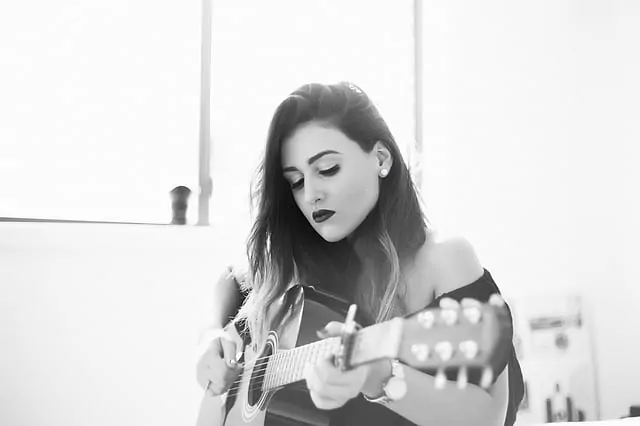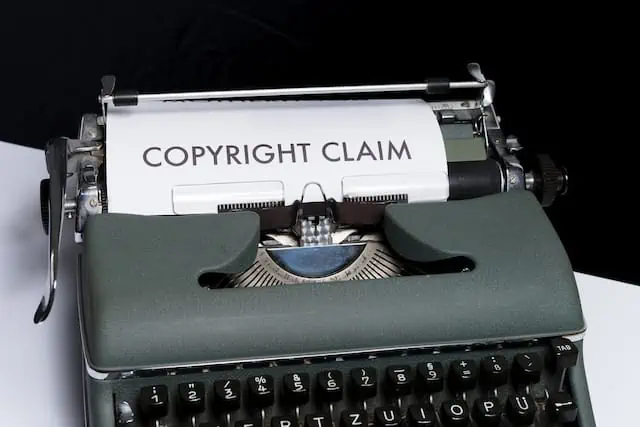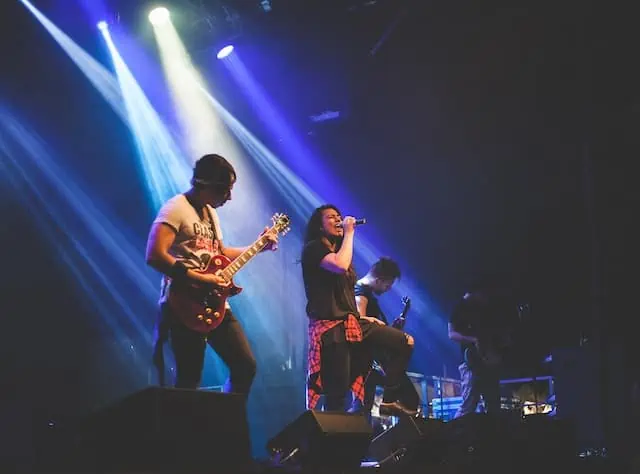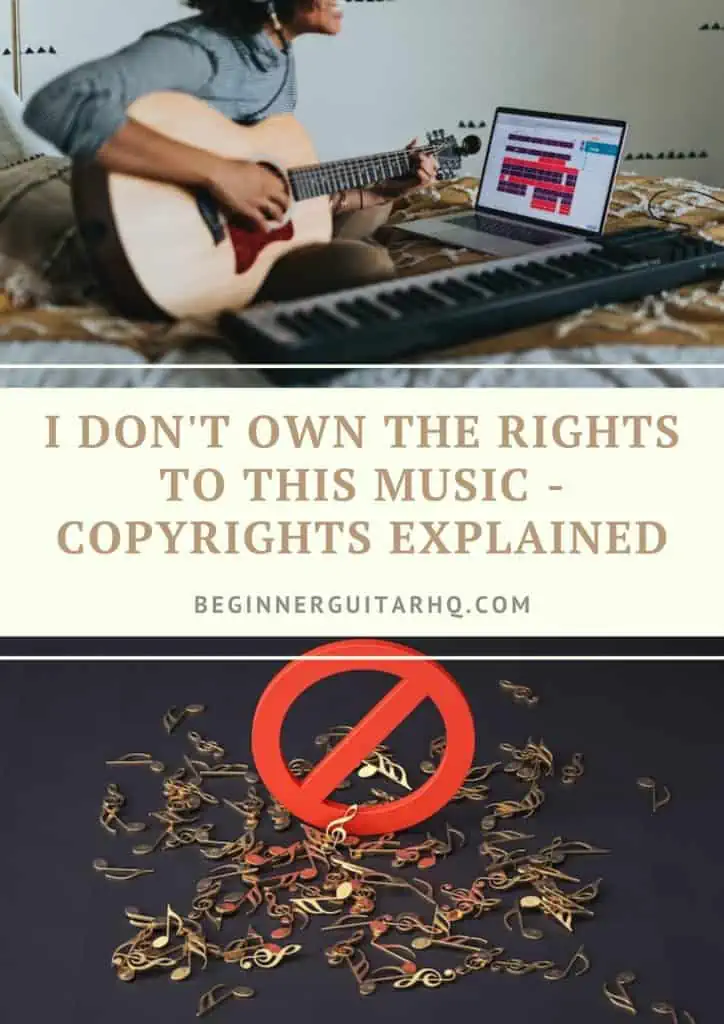We all play other people’s songs. Whether we’re jamming on our guitar or listening to a track. We play these songs at our parties and big life events. Of course, there is no law to this private use of music. But, if you’re in a cover band or cover other’s songs by yourself in venues or on the internet, you play these songs publicly.
Have you ever wondered whether you’re legally able to do these things? Perhaps someone has heard you play, and come up to you and said they own the rights to the music, and you aren’t allowed to play it. The same goes for music you use on your YouTube channel. Even worse, maybe someone has taken legal action against you.
And on the flip side, how do you protect your music? After all, you’re essentially bearing your soul. But it’s also your creation and something that has the potential to bring in money. ”I don’t own the rights to this music” isn’t something you’ll have to say ever again once you follow these steps. Well, if you’re playing covers, at least you can get a license to use it, and if you copyright your music, your work will be protected, because you own the rights.
Copyright laws can get very complicated and can leave many a muso worried about whether they’re going to get into trouble or lose out. It’s easy to fall into the trap of copyright infringement. I’m going to explain copyright, both in light of other musician’s rights and your rights to your music.
Contents
What is Copyright?
Copyright is the legal right someone has to own their intellectual property, for our purposes, music. Intellectual property is a creation of a person’s mind. The copyright gives the owner the right to sell, distribute, perform, adapt, and use their music. This is automatic the moment the song is created. An official copyright, however, requires other people to get a license to do those same things with that song and pay the person who owns the copyrights. It also gives the artist or band the proof they need to enforce this.
If someone does any of these things publicly without the correct license, it’s called copyright infringement, and it’s punishable by law. I’m sure you’ve heard of at least one artist or band being taken to court over copyright infringement.
The Two Copyrights in Play with Each Song
Music is unique in that each song has two copyrights:
- The musical composition: This would be the lyrics, beat, and instrumental parts. Essentially, the song itself.
- The master recording: This is for the recording of the song, no matter what medium it’s on. You can record your song on an old 8 track or reel-to-reel, and this will still hold. Of course, these days it’s far more likely to be recorded onto a hard drive and less and less commonly, CDs.
Establishments who play music will purchase licenses for both these copyrights.
Should Cover Bands or Tribute Bands Worry?
The question here is where you’re playing. Chances are that if you’ve been performing at establishments, you haven’t had to worry. This is because legitimate venues, who have musicians come in regularly performing covers or even their own music, have purchased blanket licenses. This covers the establishment and bands against copyright infringement. If you’re worried, check with the establishment.
Now, if you’re putting together your own concerts outside these establishments, or you play covers on a YouTube channel, you need to make sure that you have the appropriate license for those songs. If you are popular enough to be noticed, there is a chance that at some point, someone may come knocking for their royalties.
Tribute bands need to be extra careful about this as their performances are a copy, whether poor or great, of a specific band. It’s up to the original musician what happens. Some love it, some hate it. And many want their royalties.
How to Avoid Getting Sued
Getting into legal trouble is something no one wants. And at the same time, I’m sure you can appreciate as a musician yourself, that using someone else’s work publicly without paying them royalties for it, is wrong.
Even if you’re someone who would be happy just to have someone playing your music, you still likely want some recognition. If you don’t claim the song as your own and name the artist or band, there will be those who appreciate it. But there are many artists who won’t and will want to take some sort of legal action. You may even find platforms like YouTube shutting down your channel. They can get into legal trouble too if they knowingly allowed you to commit copyright infringement.
Of course, it makes things harder. If you’re someone that wants to post covers on a public platform like YouTube to grow your channel, this added step and the expense is inconvenient. But it’s necessary and once you start releasing your own music, one you will appreciate.
To make sure that you’re never violating copyrights, there are a few things you can do:
- Only cover music within the public domain (copyright expired- generally 70 years after the creator’s death or isn’t applicable such as anything created before 1923, and anything with an unrenewed copyright created between 1923 and 1968, and songs that the creators’ put in the public domain)
- Obtain a compulsory mechanical license (the copyright board sets the fee), this is for when you want to distribute the song for private use, for example, over YouTube, and the basic melody and lyrics stay intact
- Obtain a streaming compulsory mechanical license if you’re going to distribute the cover for streaming, for example, on Spotify without changing the basic melody or lyrics
- Obtain a public performance license if you’re going to be performing in public (if you aren’t going to be playing in venues with a blanket license)
- If in doubt, always link to the original content or at least give the name of the original creator, though if you’ve violated the copyright, this won’t help you
If in doubt, contact the creator/s of the song.
When to Consult a Lawyer
There are times when you will need to consult an intellectual property lawyer to obtain the license and sort out royalty payments:
- If you want to use the song for a film that will be shown publicly
- If you want to make changes to the song
- If you want to sample the audio
- If you want to make a music video
This is because generally the royalties will need to be negotiated with the owner as opposed to simply obtaining a compulsory license. The owner can also refuse permission.
How to Obtain a License on Your Own
Many people go through agencies like the Harry Fox Agency. You’ll need to sign up to use the platform. You can also go through a Performing Rights Organization (PRO) to obtain performing licenses. Another way is to get the license directly from the music publisher or copyright owner.
Whatever route you decide to go, you need to serve a “Notice of Intention” (NOI) on the copyright owner 30 days before you start distributing your covers or use the music publicly. If there is more than one copyright owner, you can send it to just one of them, though it increases your chances to be on the right side of the law if they’re difficult to find, to send one to all of them. If you can’t find the copyright owner, submit the NOI to the United States Copyright Office.
If you can’t go through the Copyright Office, try PROs like the American Society of Composers, Authors and Publishers (ASCAP), SESAC, or BMI. This may be an even better place to search. If the rights holder is outside the U.S., you may find them using a PRO specific to their country.
Here is what your NOI needs to contain:
- Your full legal name
- Your phone number and full address
- Your full legal name or that of the person or entity that will be distributing the music on your behalf
- The title of the song
- The name of the author or authors of the song, if known
- The copyright owner/s of the song, if known
- The expected date of initial distribution of recordings already made (if any) or expected to be made
- The name of the principal recording artist or group engaged or expected to be engaged in covering the composition
- The types of phonorecord configurations already made (if any) (i.e., single disk, cassette, reel-to-reel, digital phonorecord delivery)
- If applicable, the catalog numbers and label name used or expected to be used on any recordings already made or expected to be made
- If applicable, the date of any recordings already made
You’ll then pay the royalties owed to the copyright owner. There is a loophole that is well-known in the industry, however. If you’re unable to locate the copyright holder, and you’ve made a decent attempt to find them, you aren’t expected to pay the royalties. You’ll still need to submit a statement to the Copyright Office, however.
If you’re going to be copyrighting your music, make sure people can find you, so you don’t miss out on what’s due to you.
Intellectual Property and Your Music
You may feel you own what you’ve written. And that’s true as we’ve already established. Once you’re written a song, you own it. The problem comes in when someone challenges you for those rights or uses your song without your permission.
Your word that you own the copyright won’t get you very far, unfortunately. It’s like a “he said, she said” situation. You actually need proof. Sadly, just showing the page you wrote your song on, or showing the time stamps if it’s a digital document or recording may not be enough.
And not to be paranoid, but as countless tales in history show, you get unscrupulous people who will steal your song right from under your nose. It’s not impossible that someone will take what you’ve composed and copyright it under their name, leaving you in the dust.
If you believe in the potential of your music, copyrighting it is a must. If your music goes viral or at least becomes fairly popular, you will end up losing out if you don’t have a copyright. This is why it’s important to copyright your music.
We’ve already gone over this in the previous copyright section, but in case you skipped that section, here you go. If someone wants to distribute your song, they need a mechanical license. If they want to perform your song, they need a public performance license. In order to use your song in a film or video, they need a synchronization license. In all these cases, they will need to pay you royalties for using your song in a public way.
Benefitting From Blanket Licenses
If you’re performing original music at an establishment that has a blanket license, you can obtain royalties. You just need to submit your set list to your performing rights organization. Yes, you can sign up with one of the PROs and I recommend that you do. That way, you will be more likely to receive royalties.
How to Copyright Your Music
If you’re going to copyright your music, it’s going to cost you. It’s not too expensive though. To save some money, publish a few at once. At the time of writing, this is what you can expect to pay:
For electronic applications these are the fees:
- For a single author, same claimant, one work, not for hire, the fee is $45
- For a standard application, the fee is $65
- For a group of works on an album, the fee is $65
You’re going to need the lyrics in the form of a document and a digital recording. If it’s instrumental, you can submit the sheet music instead of lyrics. If you prefer to go to a physical office, you can submit the recording on a CD.
When it comes to recording your music, if you want to do it regularly with a more professional sound, you should set up a home recording studio. Otherwise, a simple set up with a good mic and your guitar and computer will suffice.
For sheet music, you can use the open source tool, Musescore. To make things easier, if you’re adept at playing keyboard, you can use a midi controller and just export the sheet music. This can be done via your Digital Audio Workstation (DAW) or Musescore.
Once you have these things, you can upload them to the relevant site. Each country has their own, though some allow international musicians to register copyrights too. You can go through Copyright Office for U.S and international copyright registration.
It’s pretty simple. There are no frills on this site. Start at the Registration drop down menu, and go from there. Each step is clear in what you need to do, just fill in and upload as required. If you have any questions, they have a pretty extensive FAQ section.
Once you’ve completed everything, it will take you to a payment page and you can select your preferred method.
It can take a few weeks to a few months, but you’ll receive an official certificate once your application is processed and your song is copyrighted.
Legal Steps to Take if Someone Violates Your Copyright
Provided you’ve filled in your details correctly and completely, there is no excuse for someone using your song without a license and without paying you royalties.
Understanding Copyright Infringement
While this seems a silly thing to clarify, it’s good to know. Especially if you are going to take legal action.
Direct Infringement
This would be when someone directly violates copyright. For example, another guitarist starts playing your song on YouTube, whether they attribute it to you or not. If they haven’t served you an NOI and obtained a license and paid you royalties, they are directly violating the copyright.
Secondary Infringement
I won’t use YouTube as an example as they tend to protect themselves pretty well against this kind of thing, though it does happen sometimes. But say that guitarist now starts streaming their version of your song on one of the streaming platforms or makes a bunch of CDs, and their friend starts selling it for them (yes, people do still buy CDs). The streaming service or the friend would be committing secondary infringement.
However, the streaming platform and friend need to be aware of the direct copyright infringement and be benefitting from it. If they can prove that they had no idea that the song actually belongs to you, they can’t be sued. Of course, the guitarist is still liable for their direct copyright infringement.
Legal Action Options
Legal action can only be taken if you have a copyright. It’s not impossible that you can prove without the copyright that the song is yours, but legally, registered copyrights generally win. So if you haven’t filed a copyright application, do so as soon as possible. Once you have that in place there are two options, though the first option is recommended even if you use option 2.
- Cease and Desist Letter: This is an alternative to a lawsuit or can be used while filing a lawsuit. Of course, if they don’t stop committing copyright infringement after receiving the cease and desist letter, you can choose to file a lawsuit. You can send the letter without going through a lawyer, though your letter may hold more clout if it’s supported or written by a law firm.
- Lawsuit: As the owner of the copyright, you are entitled to statutory copyright damages, provided you win the lawsuit. If you’ve copyrighted your work, you have undeniable proof on your side and chances are that you will win.
When consulting a lawyer, look specifically for an intellectual property lawyer as it can get quite complicated as we all know. These lawyers specialize in intellectual property rights and copyright law.
Conclusion
While things can get confusing, it’s actually simple if you remember that if you didn’t make the original, you don’t own it. Even songs put out on social media are subject to copyright laws. If you didn’t create it, it isn’t yours. Always follow the procedure to get the license for songs that aren’t yours. Once you’ve done that, you’re free to create and even tweak them slightly to put your own flavor into the mix. Or, stick to songs that you know for sure are in the public domain.
And you can get your music copyrighted. Don’t let people profit unfairly off of your creations that you’ve put your soul into and that you’ve worked hard to produce. If your songs have the potential to reach a wide audience and gain popularity, it’s even more important to copyright them to make sure you get what you deserve. It may be flattering to have people think your songs are awesome enough to cover, but not when you, as the creator, aren’t benefiting too.
So happy jamming and creating!



